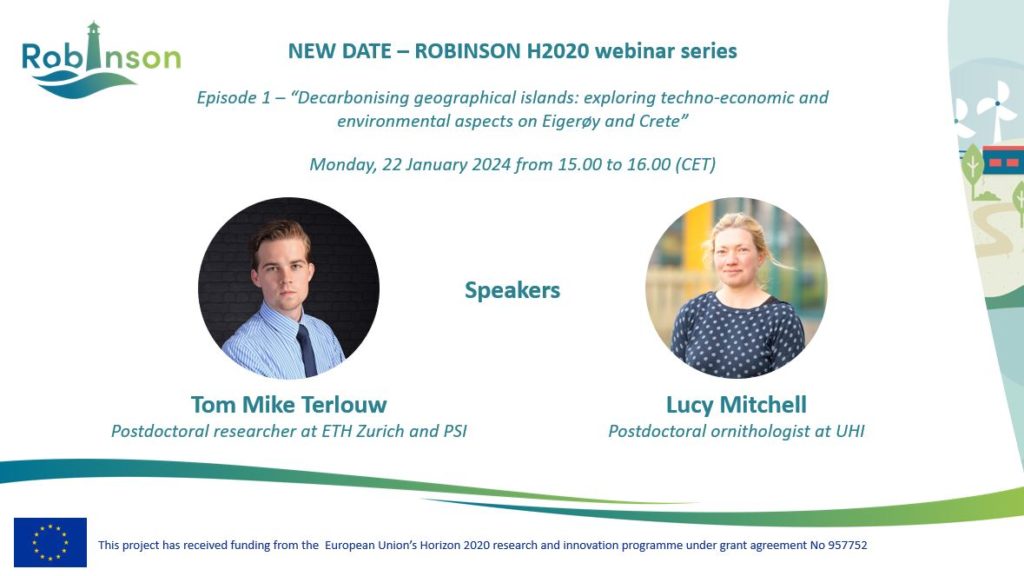
- This event has passed.
NEW DATE – ROBINSON H2020 Webinar on “Decarbonising geographical islands: exploring techno-economic and environmental aspects on Eigerøy and Crete”
22 January 2024 @ 3:00 pm - 4:00 pm
- Tom Mike Terlouw (Postdoctoral researcher at ETH Zurich and PSI).
- Lucy Mitchell (Postdoctoral ornithologist at UHI).
Abstracts of the presentations
Detailed information on the presentations can be found below:
Presentation by Tom Terlouw
Limiting global warming to 2° Celsius requires an immediate transformation of the global energy system. Renewable energy sources have to be widely integrated, in combination with various flexibility options, to ensure a reliable and sustainable operation of the overall energy system. To achieve this, the electricity system is transforming towards distributed energy systems. Geographical islands can play a crucial role to become a forerunner towards more sustainable and distributed energy systems, since they are isolated and are usually dependent on fossil fuels imported from the mainland. In this context, a novel optimization framework is presented for designing multi-energy systems (MESs) on geographical islands. The framework is solved to minimize costs and greenhouse gas (GHG) emissions while meeting the energy demands of given end-users for two real case studies: Eigerøy (Norway) and Crete (Greece). Overall, strong GHG reductions can be achieved with a marginal cost increase (in Eigerøy), or might even lead to an overall cost reduction (Crete). However, we find that (i) MESs analyses require analyzing non-climate change-related impacts as such systems typically entail some environmental trade-offs and the (ii) decarbonization potential is typically limited by location-specific regulations and socio-economic constraints.
Presentation by Lucy Mitchell
“The drive to generate efficient, lower cost renewable energy systems and communities means that there are often novel technologies and combinations of technologies employed, whose environmental effects are unquantified. This lack of quantification of device parameters or outputs can often be compounded on-the-ground by a lack of ecological data to facilitate Environmental Impact Assessments (EIAs), a standard measure of a development’s impacts. This can lead to delays, and longer, less focused environmental surveys than are really required and that do not properly ascertain impacts.
In these situations, we require methods to remedy such data absence, and to streamline the EIA process. We are tackling this in two ways; 1. We have combined a set of flexible, desk-based methods to focus initial impact assessment: we start with a Driver-Pressure-State-Impact-Response (DPSIR) framework, which leads to a comprehensive Weight of Evidence (WoE) process, and combined with a Receptor Sensitivity Index (RSI). For locations with no data these can be parameterised with data from the literature, and are fully transferable across locations and ecosystems. 2. We are developing a rapid avian biodiversity assessment method using Passive Acoustic Monitoring (PAM) devices. Time consuming, unstandardised surveys during EIAs can hinder proper assessment of potential impacts where novel combinations of renewable energy systems are being implemented. Rapid, standardised, autonomous methods of data collection can facilitate better ‘before-and-after’ assessment of ecological communities around developments.
Attendance & registrations
Registrations are free, but mandatory, and can be completed via this link on ETN website.
Important note: Once participants register to the event, they will receive an Outlook invitation with the link to join the webinar.

 This project has received funding from the European Union’s Horizon 2020 research and innovation programme under grant agreement N° 957752.
This project has received funding from the European Union’s Horizon 2020 research and innovation programme under grant agreement N° 957752. 
